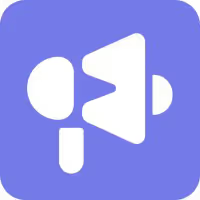Harmonic Alternatives
Find the right Harmonic alternative. This guide offers a direct comparison of 10 options, analyzing features, pricing, and use cases.
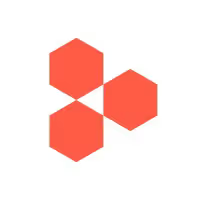
You might know Harmonic for its real-time data on early-stage startups. It performs well here, with a comprehensive view and extensive API options. It's a solid choice for deal sourcing or recruiting when other databases fall short.
But no tool is perfect, and some users find limitations. That's why we've identified the best alternatives. We analyzed their pros and cons against Harmonic, using G2 reviews, to help you create a shortlist for deeper review. Let's get started.
Consider 11x for Sales Digital Workers
Consider 11x if you want to add digital workers to your sales team. The platform offers autonomous agents for tasks like lead research and outreach. This can supplement your current sales operations and workflows.
11x is a go-to-market platform using AI agents to automate sales. Its agent Alice finds prospects, handles outreach, and maintains the CRM. Julian qualifies inbound leads and books meetings. This consolidates tools for data enrichment, outreach, and email warmup into a single platform.
Harmonic Alternatives
The following sections review the top Harmonic alternatives in detail. Each analysis covers pricing, core features, and the specific advantages and drawbacks compared to Harmonic.
1) Apollo.io
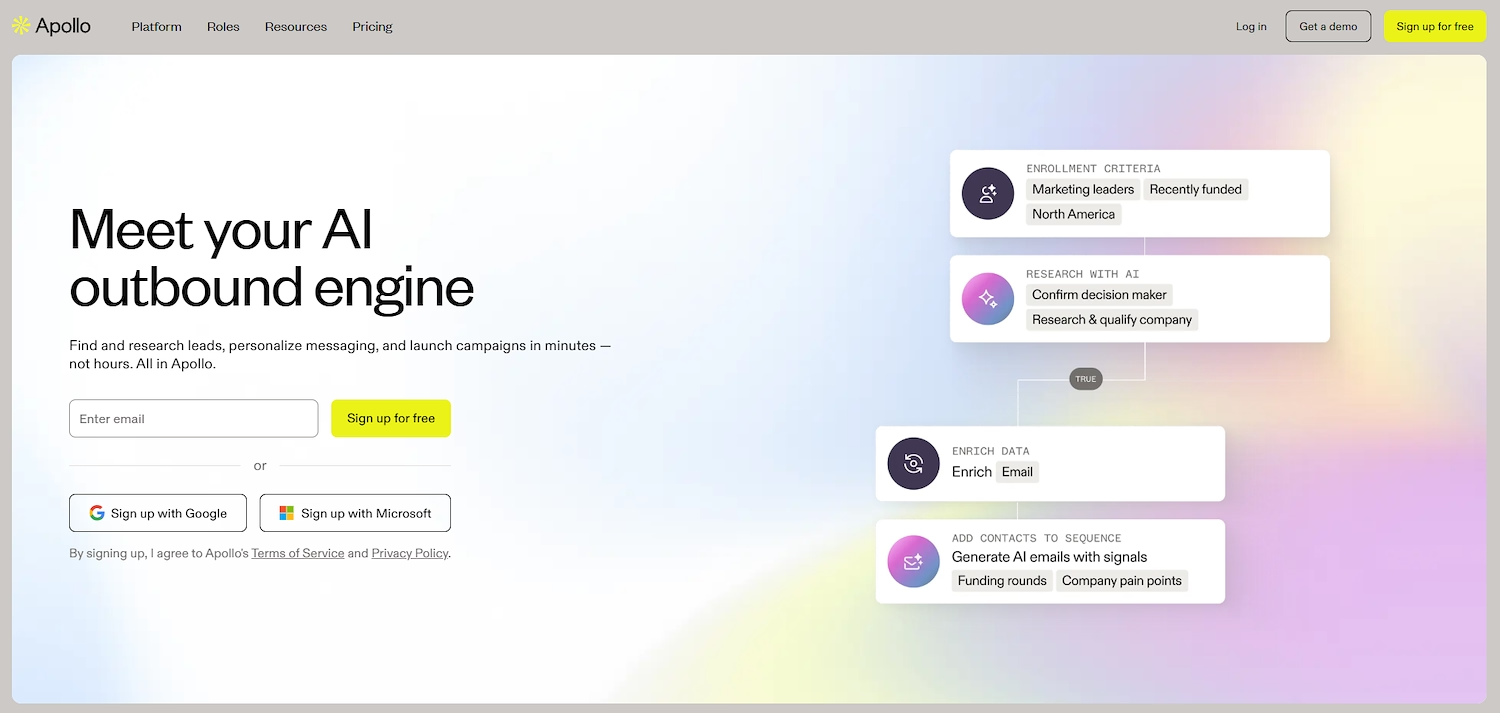
Apollo.io is a sales intelligence platform with a large B2B database of contacts and company data. Its primary use cases include prospecting, data enrichment, and outreach.
The platform combines its dataset with engagement tools. This helps sales and marketing teams find and connect with potential customers and can unify a go-to-market tech stack.
Apollo.io's Main Features
- Accesses a large B2B database containing contact and company data.
- Includes tools for prospecting new leads and enriching existing data.
- Offers engagement tools to conduct outreach to potential customers.
- Combines its dataset and engagement features to unify a go-to-market tech stack.
How Apollo.io Compares to Harmonic
Average Review score: 4.7/5 stars based on 8,904 G2 reviews.
- Apollo.io provides a broader B2B database with over 210 million contacts, while Harmonic focuses specifically on data for early-stage startups.
- It includes a built-in engagement suite for outreach and sequences, a feature not central to Harmonic's core offering.
- The tool functions as an all-in-one solution that combines its database with sales engagement tools, whereas Harmonic is more specialized for startup discovery.
- Users get lead scoring and validation features to help qualify prospects, which provides a different level of lead management compared to Harmonic's data-focused approach.
- A free plan is available for individual users, offering a way to test the platform's capabilities without an initial investment, which differs from Harmonic's pricing structure.
Where Apollo.io Falls Short Compared to Harmonic
- Apollo.io's data covers a vast range of businesses, so it can be less specialized for early-stage startups when compared to Harmonic's focused dataset.
- It may not provide the same depth of real-time signals on startup growth, like recent funding or key hires, which is a core feature of Harmonic.
- Some users find that data on very new or niche startups is occasionally less current than the information found in a dedicated startup intelligence tool.
- The platform's API is primarily for sales workflows, which can be less flexible for deep startup ecosystem analysis compared to Harmonic's data-centric API.
Budget and Pricing Considerations
Apollo.io offers transparent pricing, including a free plan and paid tiers starting at $49 per user per month. Harmonic does not publish its pricing, which suggests a custom model better suited for enterprise clients with specific data requirements.
2) ZoomInfo SalesOS
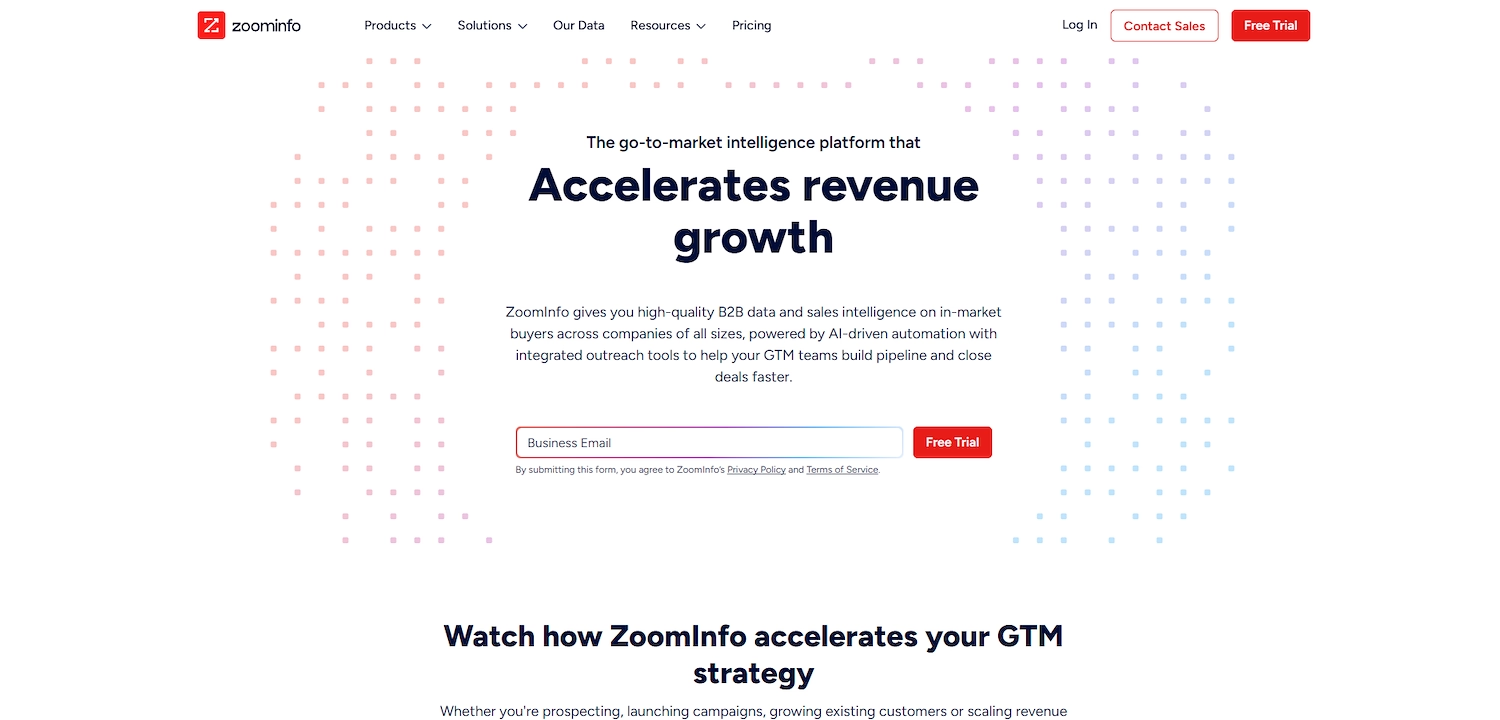
ZoomInfo SalesOS is a go-to-market intelligence platform for B2B organizations. It unifies contact and company data, buyer-intent signals, and engagement tools into a single system. This helps sales, marketing, and recruiting teams identify and connect with potential buyers.
The platform serves as a data source for GTM functions and integrates with other applications to automate workflows. A primary use is to build lead lists with verified contact information.
ZoomInfo SalesOS's Main Features
- Delivers real-time buyer intent signals to identify prospects ready for purchase.
- Analyzes call and meeting interactions through its conversation intelligence tool.
- Identifies anonymous website visitors to convert page views into sales pipeline.
- Includes a generative AI companion (Copilot) that provides insights and drafts outreach content.
How ZoomInfo SalesOS Compares to Harmonic
Average Review score: 4.5/5 stars based on 8,738 G2 reviews.
- ZoomInfo SalesOS offers a vast database of company and contact information across many industries, which is different from Harmonic's specific focus on early-stage startups.
- It provides buyer intent signals to identify prospects who are actively looking for solutions, offering a proactive sales trigger that Harmonic's startup data does not emphasize.
- The platform includes built-in sales engagement and conversation intelligence tools, creating an all-in-one system for outreach, unlike Harmonic, which centers on providing data.
- Its AI companion, Copilot, gives recommendations on who to contact and what to say, adding a layer of guided selling not present in Harmonic's data-focused platform.
Where ZoomInfo SalesOS Falls Short Compared to Harmonic
- ZoomInfo SalesOS covers many industries, so its data on brand-new startups can be less detailed compared to the information in Harmonic's specialized database.
- The platform's buyer intent signals focus on purchase readiness, which is different from the real-time startup growth indicators, like new funding, that Harmonic provides.
- Its API is designed for sales and marketing automation, which may provide less flexibility for custom ecosystem analysis compared to Harmonic’s data-centric API.
Budget and Pricing Considerations
ZoomInfo SalesOS, like Harmonic, does not publish its pricing and relies on a custom-quote model. For the most accurate and up-to-date pricing information, we recommend visiting the ZoomInfo SalesOS's official website.
3) Crunchbase
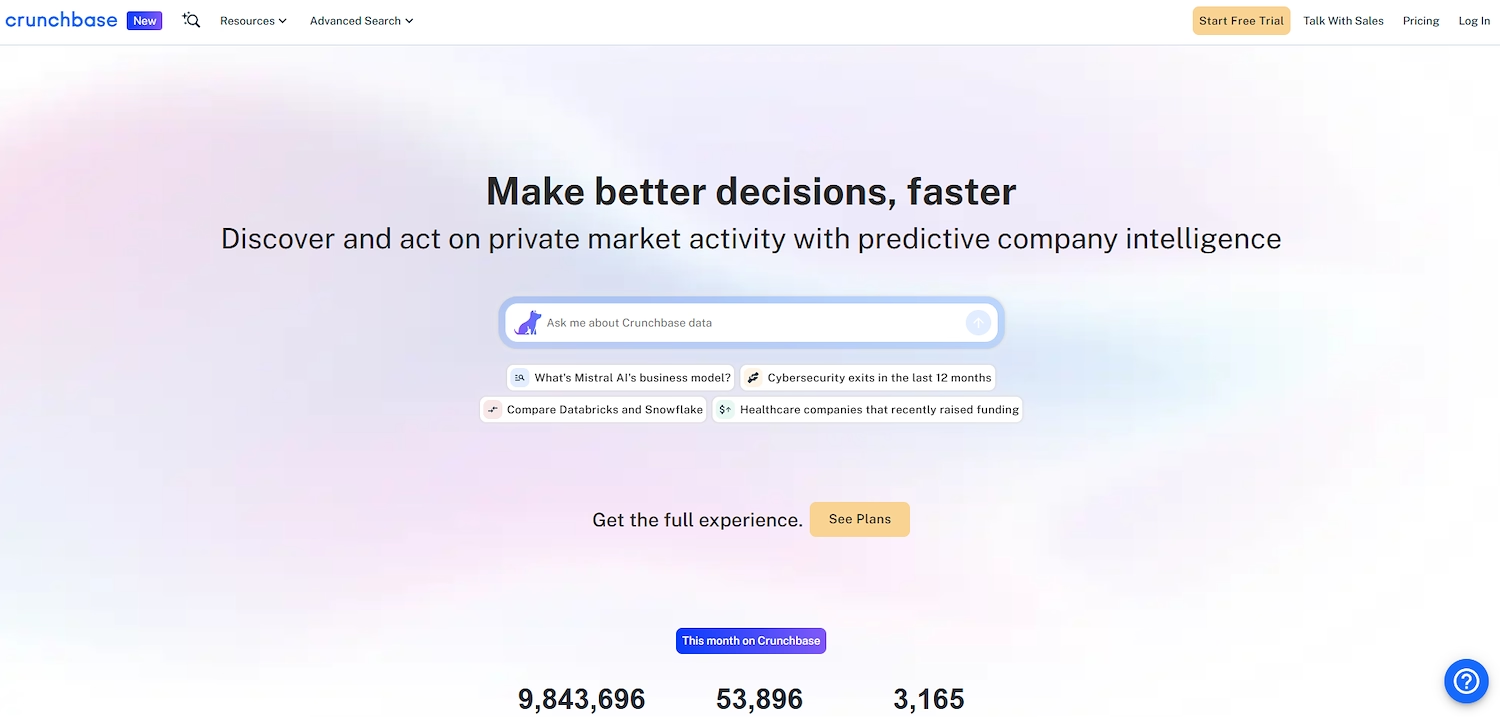
Crunchbase is a private-company intelligence platform to discover and track activity in global private markets. It offers predictive analytics and real-time data, with millions of new predictions and insights added monthly.
Users can identify tech companies likely to raise funds, compile lists of new startups, and analyze business models. The service acts as a central hub for private-market data to inform decisions.
Crunchbase's Main Features
- Provides algorithmic predictions on events such as IPO likelihood, funding rounds, growth, and leadership hires.
- Offers trend and insight feeds that surface notable events across companies through continually updated cards.
- Delivers personalized private market analysis through customized dashboards and alerts tailored to a user's watchlist.
- Includes an AI-driven research assistant, Crunchbase Scout, to help with research tasks.
How Crunchbase Compares to Harmonic
Average Review score: 4.5/5 stars based on 377 G2 reviews.
- Crunchbase provides predictive analytics to forecast future events like funding rounds, which is a different approach from Harmonic's focus on real-time signals.
- Its transparent pricing with monthly options makes the platform accessible to individuals and small teams, unlike Harmonic's custom-quote model.
- The platform includes an AI research assistant, Crunchbase Scout, for a different research experience compared to the direct data exploration in Harmonic.
- This tool covers a wide range of private companies, not just startups, for a broader market view than Harmonic's specialized database.
Where Crunchbase Falls Short Compared to Harmonic
- Crunchbase's broad market coverage means its data on very new or niche startups can be less detailed compared to Harmonic's specialized, real-time information.
- The platform's signals focus on predictive events like funding rounds, which is different from the granular, real-time growth indicators, such as team size changes, that Harmonic provides.
- Some users find that its API, built for general private market research, may offer less flexibility for deep ecosystem analysis than Harmonic’s data-centric API.
Budget and Pricing Considerations
Crunchbase offers a transparent Pro plan at $99 per user monthly or $588 annually, making it accessible for individuals. In contrast, Harmonic uses a custom-quote model suited for enterprise clients. Check the detailed pricing of Crunchbase on Crunchbase's official website.
4) Clearbit
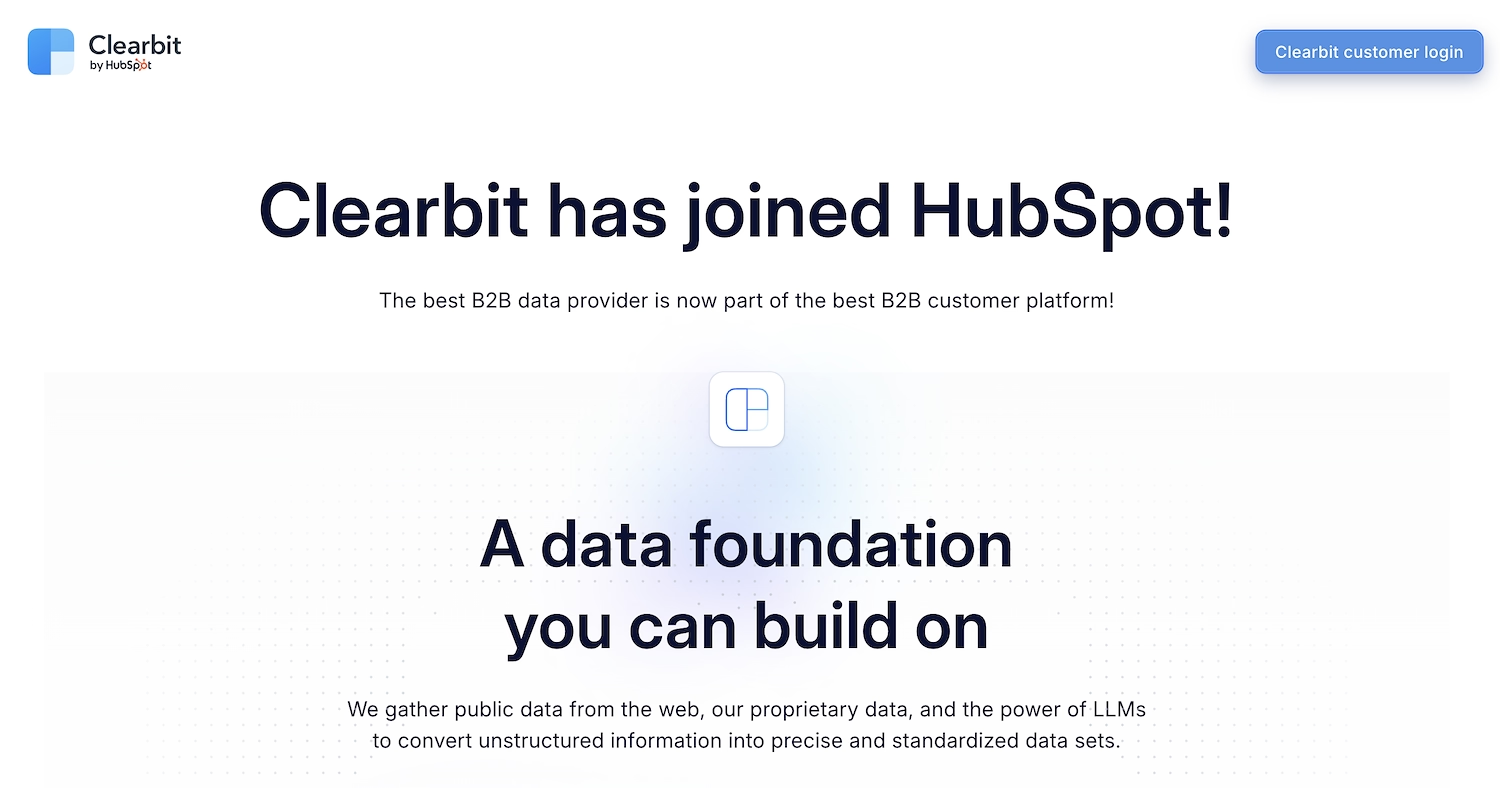
Clearbit is a marketing data engine that uses a B2B database to help businesses with customer intelligence and prospect identification. The platform offers real-time data enrichment for contacts and companies.
Its data supports lead qualification and precise ad campaigns. The goal is to create a complete picture of every lead and customer for sales and marketing teams.
Clearbit's Main Features
- Enriches contact and account records with firmographic and demographic details.
- Supplies data for real-time lead scoring using industry classifications like 6-digit NAICS and corporate hierarchy mapping.
- De-anonymizes website traffic to identify visiting companies that match an ideal customer profile.
- Shortens web forms by automatically enriching data and only showing fields when a value is missing.
How Clearbit Compares to Harmonic
Average Review score: 4.4/5 stars based on 626 G2 reviews.
- Clearbit enriches records with over 100 data points for a wide range of companies, while Harmonic focuses on real-time growth signals specific to early-stage startups.
- It identifies anonymous companies visiting your website, providing a source of new leads that Harmonic's startup discovery model does not offer.
- The platform shortens web forms by auto-filling known information, a feature for marketing conversion that differs from Harmonic's data analysis purpose.
- This tool offers deep integrations with marketing platforms like HubSpot to automate workflows, whereas Harmonic provides a data-centric API for custom analysis.
Where Clearbit Falls Short Compared to Harmonic
- Clearbit covers a wide range of businesses, so its data on new startups may lack the depth of Harmonic's real-time information on funding or team growth.
- The platform's data focuses on firmographics rather than the real-time growth signals, like key hires or tech stack changes, that Harmonic provides for startup analysis.
- Some users find its API, designed for marketing automation, offers less flexibility for deep ecosystem analysis compared to Harmonic’s data-centric API for custom research.
Budget and Pricing Considerations
Clearbit, like Harmonic, does not publish its pricing and relies on a custom-quote model suited for enterprise clients. For the most accurate and up-to-date pricing information, we recommend visiting Clearbit's official website.
5) LeadIQ
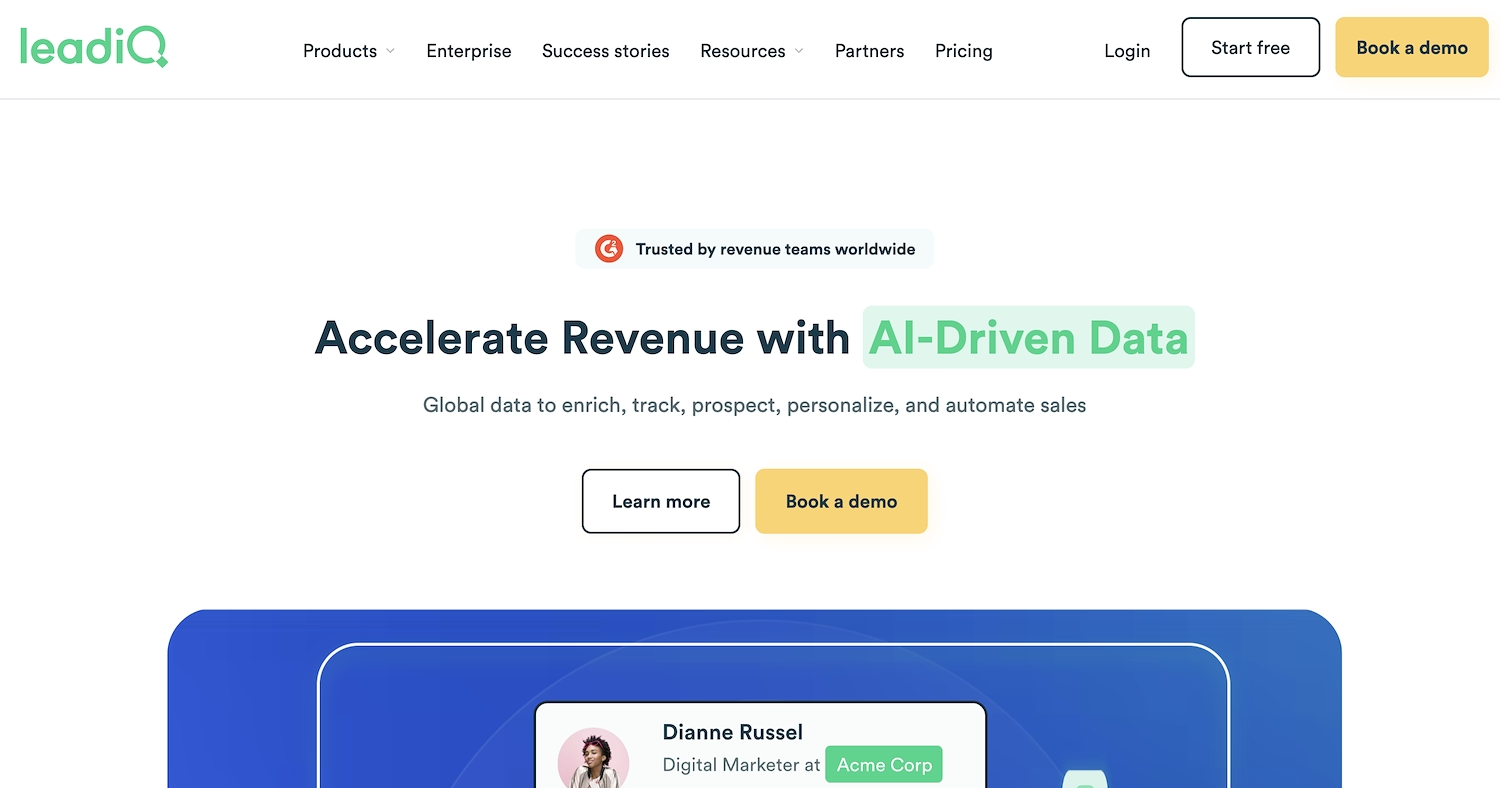
LeadIQ is a sales intelligence platform that offers a B2B database to find and capture contact information. It is a tool for sales teams to build prospect lists.
The platform focuses on the acquisition of verified data to support outbound sales campaigns. It provides information for teams to connect with potential customers.
LeadIQ's Main Features
- Provides verified business emails and direct dials with global coverage, including compliant EMEA data.
- Generates personalized outreach with an AI tool and captures contact data from LinkedIn in a single click.
- Automates champion tracking to detect job changes and surfaces buying signals like funding rounds and G2 intent.
- Integrates with Salesforce, HubSpot, Outreach, and Salesloft to sync data directly into existing workflows.
How LeadIQ Compares to Harmonic
Average Review score: 4.2/5 stars based on 1,097 G2 reviews.
- LeadIQ supplies verified business emails and direct dials for sales teams. This is a more direct approach for outreach compared to Harmonic's focus on company-level growth signals.
- The platform includes an AI tool to help generate personalized outreach. This offers a sales enablement function not present in Harmonic's data-focused platform.
- It tracks when key contacts change jobs, a specific sales trigger different from the broader startup growth indicators that Harmonic provides.
- With a free plan and public pricing, LeadIQ is available to individual users. This contrasts with Harmonic's custom-quote model designed for enterprise clients.
Where LeadIQ Falls Short Compared to Harmonic
- LeadIQ provides broad B2B contact data, which can be less specialized for deep analysis of the startup ecosystem compared to Harmonic's focused, real-time signals.
- The tool's integrations sync data into sales platforms. This is different from Harmonic's data-centric API, which is designed for custom analysis of the startup market.
- Its primary function is to find contact data, which some users report is occasionally inaccurate. This contrasts with Harmonic's focus on company-level signals like team growth.
Budget and Pricing Considerations
LeadIQ offers transparent pricing with a free plan and paid tiers starting at $45 per user per month. In contrast, Harmonic uses a custom-quote model, making LeadIQ more accessible for individuals and small teams, while Harmonic is better suited for enterprise clients.
Add Digital Workers to Your Sales Team
If your primary need is to automate sales tasks rather than just source data, 11x offers a different approach. Its digital workers can handle lead research, outreach, and CRM updates for your team.
This can be a practical way to add capacity to your sales operations without expanding your headcount. Visit the 11x website to see how its autonomous agents work.
At 11x, we use AI to run your sales playbook. Our agent Alice finds accounts and starts outreach, while Julian qualifies prospects and schedules meetings. The platform replaces tools for data enrichment, intent signals, and email warmup, so you don't need extra software or hires.
Book a demo to see how it works.
6) Lusha
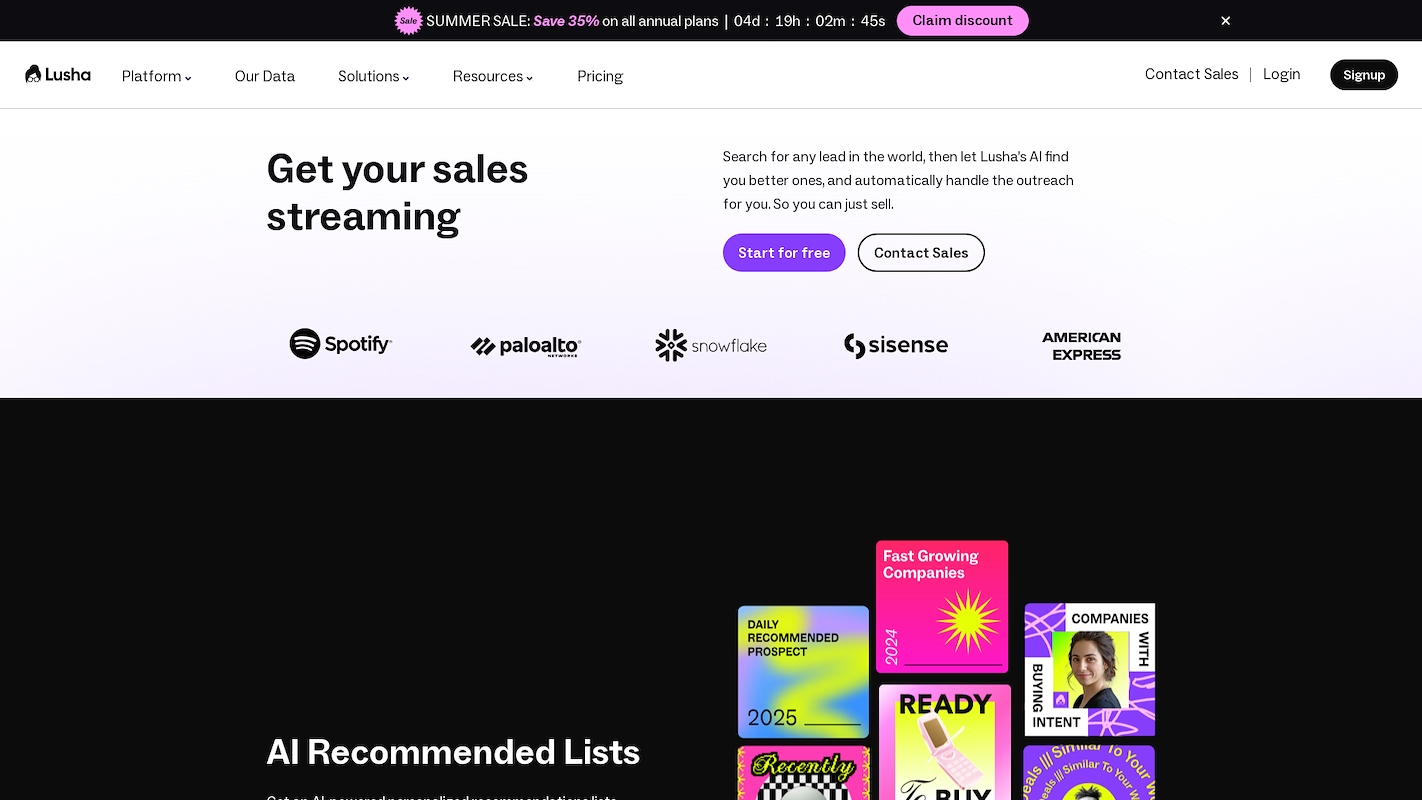
Lusha is a sales intelligence platform that provides a B2B database of company and contact data. It is a tool for sales professionals to find accurate contact information.
The platform's main function is to supply direct dials and email addresses for outreach campaigns. This helps sales teams build prospect lists and connect with potential customers.
Lusha's Main Features
- Delivers live, auto-updating lead lists that add new prospects at user-defined intervals.
- Automates and personalizes email sequences with AI-driven copy.
- Records and analyzes sales meetings through its conversation intelligence tool.
- Identifies in-market buyers and provides real-time notifications on intent triggers.
How Lusha Compares to Harmonic
Average Review score: 4.3/5 stars based on 1,516 G2 reviews.
- Lusha provides direct contact information like verified emails and phone numbers, a different approach from Harmonic's focus on company-level growth signals.
- It offers a free plan and transparent monthly pricing, which makes the tool accessible for individuals, unlike Harmonic's custom-quote model for enterprise clients.
- The platform's AI Prospect Playlists automatically generate and refresh lead lists, a prospecting automation feature not central to Harmonic's data platform.
- This tool identifies in-market buyers and sends real-time notifications on intent triggers, a sales-focused signal different from Harmonic's startup growth indicators.
Where Lusha Falls Short Compared to Harmonic
- Lusha's data covers a wide range of businesses, so its information on new startups can be less detailed. It may not have the same real-time signals on funding or team growth that Harmonic provides.
- The tool's API is designed to sync data into sales platforms. This can be less flexible for custom market analysis when compared to Harmonic's data-centric API for deep research.
- Its focus is on providing contact information for outreach. This is different from Harmonic's emphasis on company-level growth signals, such as technology stack changes, for startup evaluation.
Budget and Pricing Considerations
Lusha offers transparent pricing, including a free plan and paid tiers starting at $36 per user per month. In contrast, Harmonic uses a custom-quote model, making Lusha more accessible for individuals and small teams, while Harmonic is better suited for enterprise clients.
7) Cognism
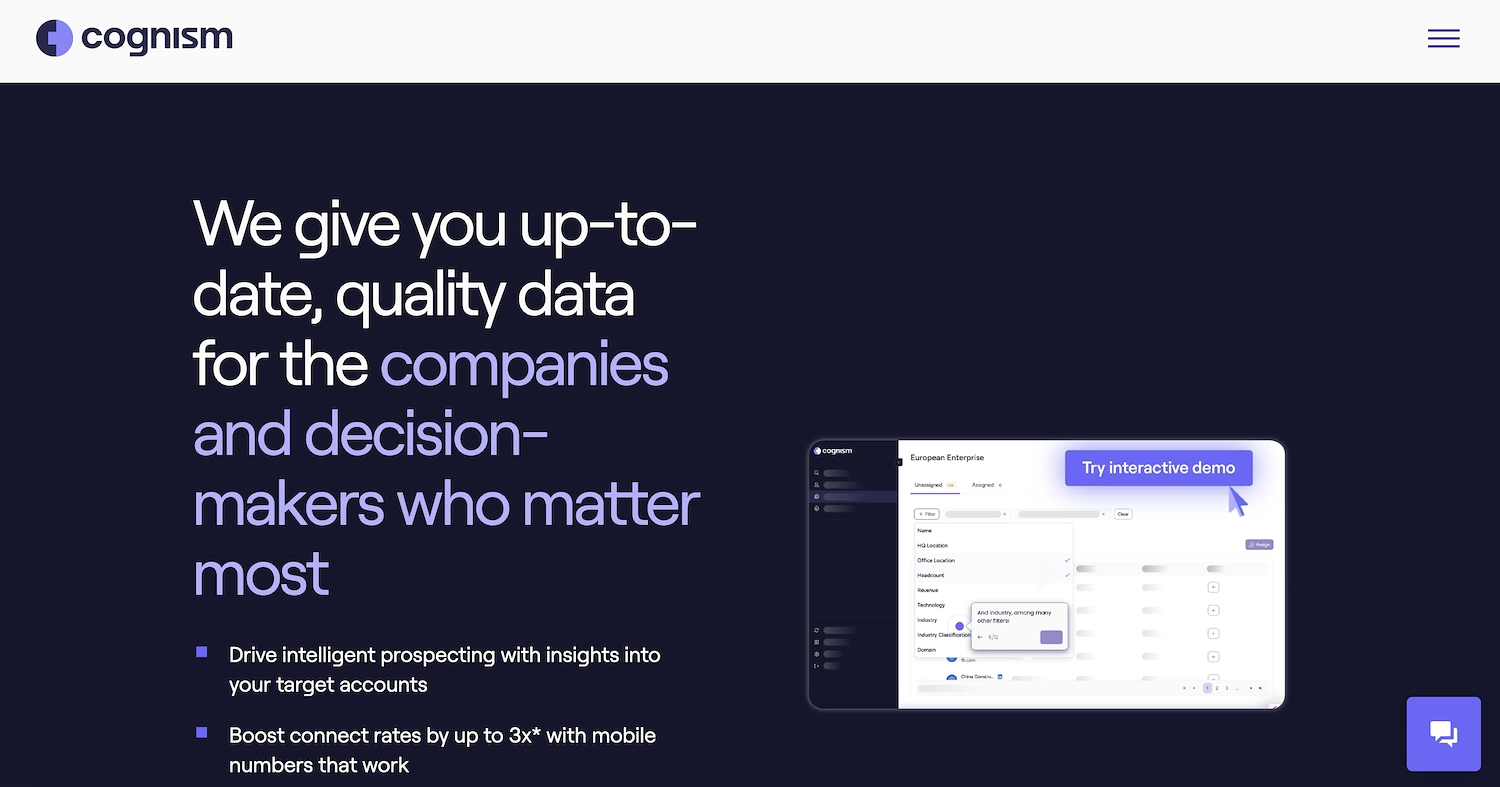
Cognism is a sales intelligence platform with a focus on its B2B database. It provides sales and marketing teams with compliant contact and company data for global markets.
A primary use is to build prospect lists for outreach campaigns. The platform also serves to enrich existing records with accurate information to support go-to-market functions.
Cognism's Main Features
- Supplies phone-verified mobile numbers, called Diamond Data®, that are checked by humans to increase connect rates.
- Provides extensive contact data coverage for the UK and EMEA markets.
- Includes a database of senior-level decision-makers screened against Do-Not-Call lists for compliant outreach.
- Offers a sales companion tool that gives contact suggestions and integrates signal data into the prospecting workflow.
How Cognism Compares to Harmonic
Average Review score: 4.6/5 stars based on 1,033 G2 reviews.
- Cognism provides phone-verified mobile numbers, known as Diamond Data®, for higher connect rates. This is different from Harmonic, which focuses on company-level growth signals instead of individual contact verification.
- The tool offers extensive, compliant contact data for EMEA markets. This provides a regional advantage compared to Harmonic's broader, less geographically-focused startup database.
- It focuses on providing compliant contact data for direct sales outreach. This is a different use case than Harmonic, which provides company-level signals for market analysis and discovery.
- A sales companion tool suggests contacts and integrates signal data directly into the prospecting workflow. This differs from Harmonic’s data-centric API, which is designed for custom ecosystem analysis.
Where Cognism Falls Short Compared to Harmonic
- Cognism covers a wide range of businesses, so its data on new or niche startups can sometimes be less detailed compared to Harmonic's real-time information.
- The tool's signals focus on purchase intent, which is different from the real-time startup growth indicators, like new funding or team size changes, that Harmonic provides.
- Some users find its API, built for sales automation, offers less flexibility for custom market analysis compared to Harmonic’s data-centric API for deep research.
Budget and Pricing Considerations
Cognism, like Harmonic, does not publish its pricing and relies on a custom-quote model. This approach suggests both platforms are better suited for enterprise clients with specific data requirements. For the most accurate pricing information, we recommend visiting the Cognism website.
8) Seamless.AI
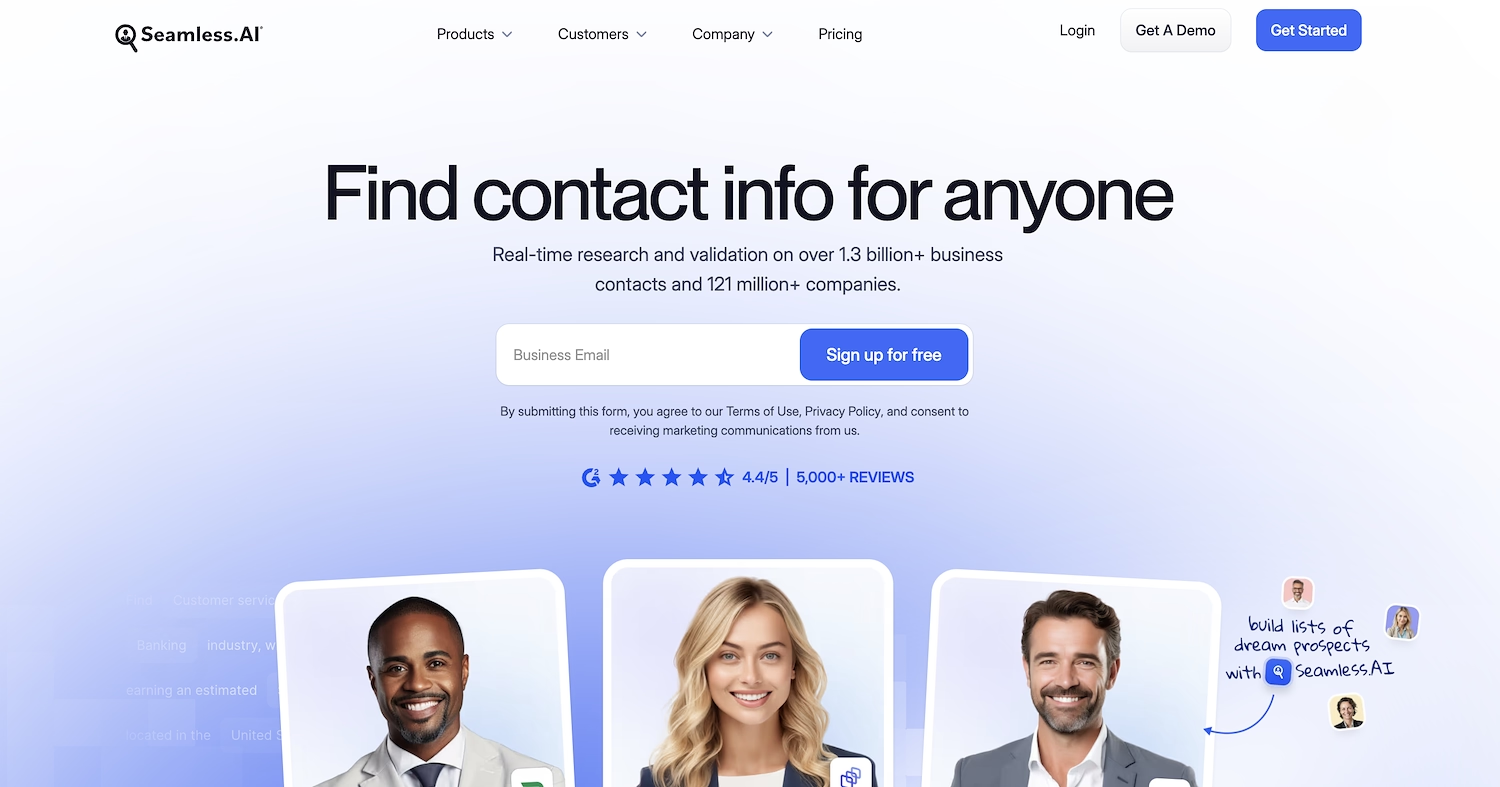
Seamless.AI is a real-time search engine for B2B data. Sales teams use the platform to find verified contact and company information. It builds prospect lists with direct dials and emails to support outbound sales campaigns and connect with decision-makers.
Seamless.AI's Main Features
- Uses a real-time search engine to find verified contact and company information.
- Offers buyer intent data and tracks job changes to signal sales opportunities.
- Enriches contact and company data to maintain accuracy in existing records.
- Integrates with CRMs and sales tools, including Salesforce, HubSpot, and Salesloft.
How Seamless.AI Compares to Harmonic
Average Review score: 4.4/5 stars based on 5,067 G2 reviews.
- Seamless.AI provides verified contact information like emails and direct dials through its real-time search engine, offering a different value for sales outreach compared to Harmonic's focus on company-level growth signals.
- It offers buyer intent data and tracks job changes to identify immediate sales opportunities, which differs from the startup growth indicators, like new funding rounds, found in Harmonic.
- A free plan with credits makes the platform accessible for individual users, which is a different model from Harmonic's custom quotes for enterprise clients.
- Its direct integrations with CRMs like Salesforce and HubSpot sync data into sales workflows, whereas Harmonic provides a data-centric API designed for custom analysis.
Where Seamless.AI Falls Short Compared to Harmonic
- Seamless.AI’s broad B2B data may offer less detail on new startups compared to Harmonic’s specialized focus. The platform does not track real-time growth signals like funding or team size changes with the same granularity.
- The tool's API is designed for sales automation, which can be less flexible for custom market analysis. This is different from Harmonic’s data-centric API built for deep research into the startup ecosystem.
- Its signals focus on buyer intent, which differs from the real-time startup growth indicators that Harmonic provides. For example, it may not track a startup's technology stack changes, a key signal in Harmonic's dataset.
Budget and Pricing Considerations
Seamless.AI offers a free plan, making it accessible for individuals, while Harmonic uses a custom-quote model better suited for enterprise clients. For full pricing details on paid tiers, visit the Seamless.AI website.
9) RocketReach
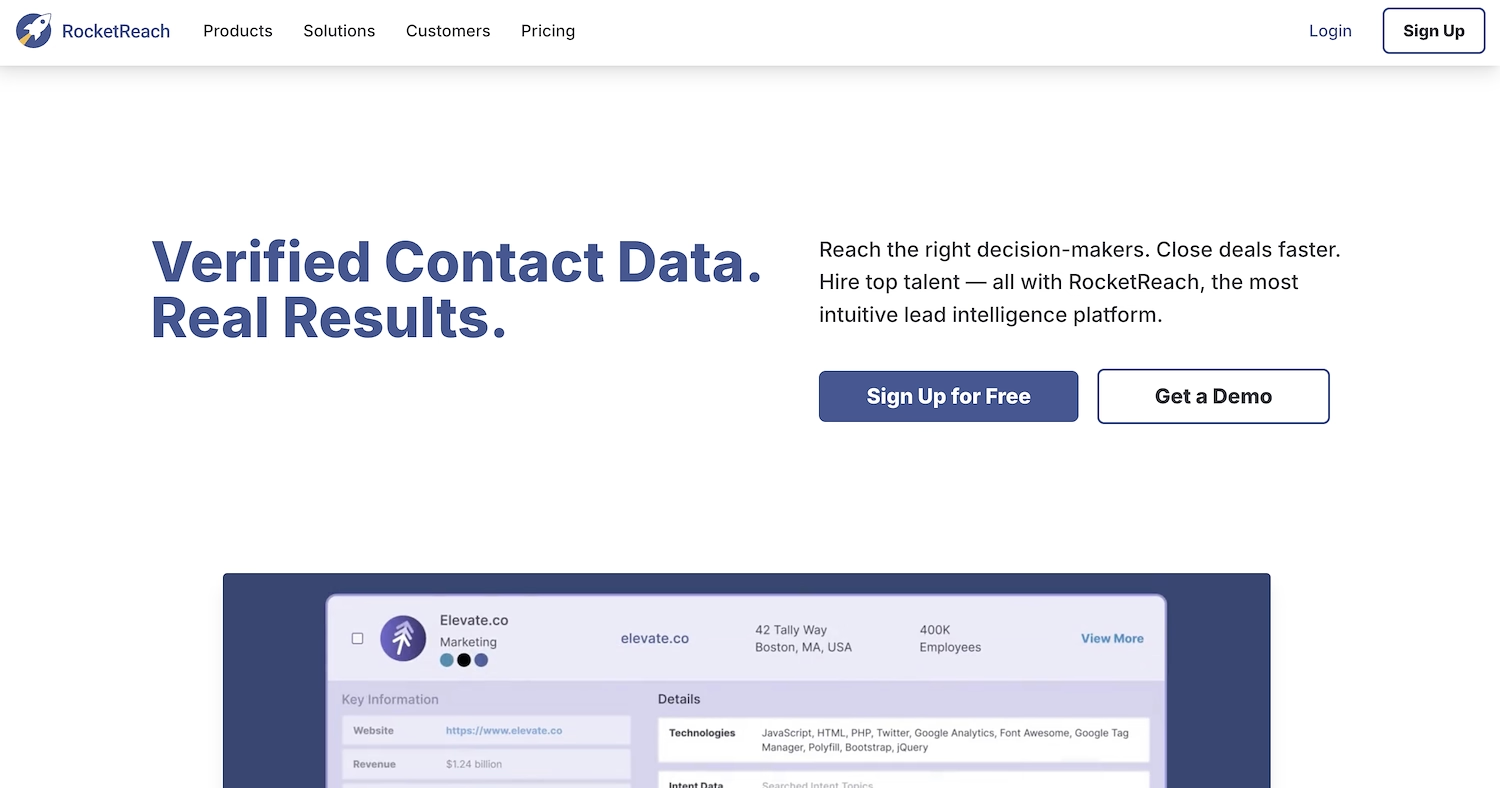
RocketReach is a search engine for B2B data, with a database of professional and company profiles. Sales and recruiting teams use the platform to find contact information for outreach. It allows users to build prospect lists and connect with decision-makers.
RocketReach's Main Features
- Provides access to a database of over 700 million professional profiles across 35 million companies.
- Includes advanced search, bulk lookup features, and browser extensions for Chrome and Edge.
- Offers an API and integrations with tools like Salesforce, HubSpot, and Zapier.
- Features an Autopilot tool to create automated workflows for discovering and engaging prospects.
How RocketReach Compares To Harmonic
Average Review score: 4.4/5 stars based on 918 G2 reviews.
- RocketReach provides access to a database of over 700 million professional profiles, which offers a broader scope than Harmonic's specialized focus on early-stage startups.
- It offers verified contact information, including emails and phone numbers, for direct outreach. This is different from Harmonic, which provides company-level growth signals like funding rounds.
- The tool includes a free plan and transparent monthly pricing, making it accessible for individual users. This contrasts with Harmonic's custom-quote model designed for enterprise clients.
- Its Autopilot tool creates automated workflows for prospect discovery and engagement. This provides a different function compared to Harmonic's data-centric API, which is built for custom market analysis.
Where RocketReach Falls Short Compared to Harmonic
- RocketReach covers a wide range of businesses, so its data on new startups can be less detailed than Harmonic's. The tool does not focus on real-time growth signals like team size changes or technology stack updates.
- Its API is designed for sales automation, which can be less flexible for custom market analysis compared to Harmonic’s data-centric API built for deep research.
- The tool's primary function is to provide contact data for outreach. This differs from Harmonic's focus on company-level signals like recent funding for strategic market analysis.
Budget and Pricing Considerations
RocketReach offers transparent pricing with a free plan and paid tiers starting at $99 per month. This contrasts with Harmonic's custom-quote model, making RocketReach more accessible for individuals and small teams, while Harmonic is better suited for enterprise clients with specific data requirements.
10) UpLead
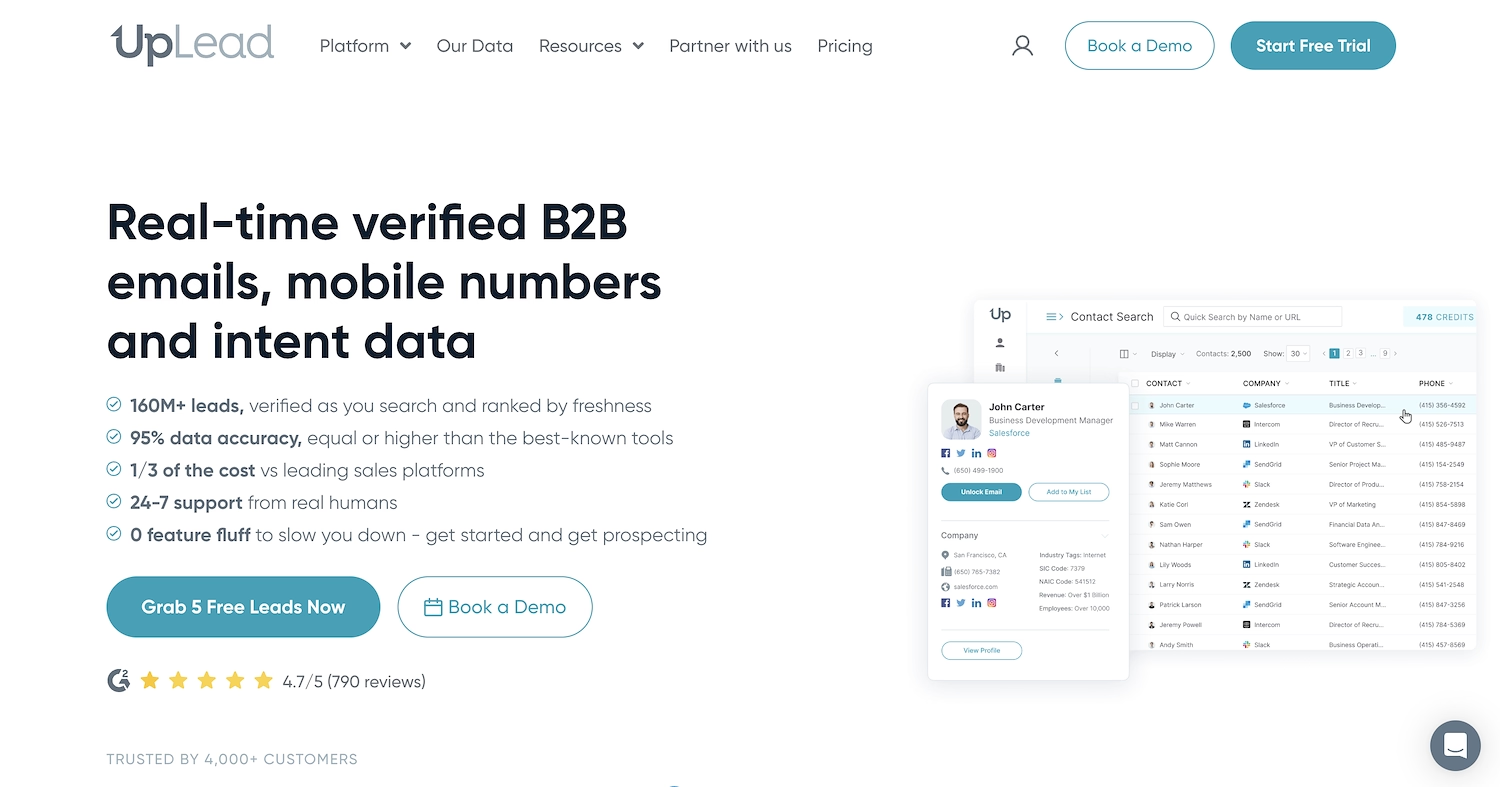
UpLead is a B2B data provider that offers contact and company profiles with a 95% accuracy guarantee. Sales and marketing teams use the platform to build prospect lists, enrich data, and find contacts for outreach. It provides verified information to support go-to-market campaigns.
UpLead's Main Features
- Provides real-time verified emails, mobile numbers, and intent data.
- Offers over 50 search filters to find in-market buyers.
- Includes features for data cleaning and lead enrichment.
- Integrates with CRMs like Salesforce and HubSpot, and with Zapier to automate workflows.
How UpLead Compares To Harmonic
Average Review score: 4.7/5 stars based on 797 G2 reviews.
- UpLead provides a 95% accuracy guarantee on its data with real-time email verification, a feature for sales outreach that differs from Harmonic's focus on company-level growth signals.
- It offers over 50 search filters, including intent data, to find specific buyers, which provides a different type of search capability than Harmonic's focus on startup discovery signals.
- With a free trial and transparent pricing, UpLead is accessible for individuals and small teams, which is different from Harmonic's custom-quote model designed for enterprise use.
- The tool supplies verified contact information, including mobile numbers and direct emails, for sales outreach, whereas Harmonic provides company-level signals like recent funding and team growth for market analysis.
Where UpLead Falls Short Compared to Harmonic
- UpLead provides data across many industries. This can make its information on new startups less detailed than Harmonic's, which focuses on real-time signals like funding rounds or team growth for that specific segment.
- The tool's signals identify buyer intent for sales teams. This is different from Harmonic's focus on startup growth indicators, such as changes in a company's technology stack, which are useful for market analysis.
- Its API primarily syncs data into sales platforms. This design may offer less flexibility for custom market research when compared to Harmonic’s API, which is built for deep analysis of the startup landscape.
Budget and Pricing Considerations
UpLead offers a free trial and transparent pricing, with paid plans starting at $99 per month, making it accessible for individuals and small teams. In contrast, Harmonic uses a custom-quote model better suited for enterprise clients with specific data requirements.
Which One Should You Go With?
Choosing a Harmonic alternative depends on your specific needs, from data depth to budget. This guide reviewed several options to help you create a shortlist for a more detailed evaluation.
If your goal is to automate sales tasks instead of just sourcing data, 11x offers a different approach. Its digital workers can manage lead research, outreach, and CRM updates, adding capacity to your sales operations without new hires.



